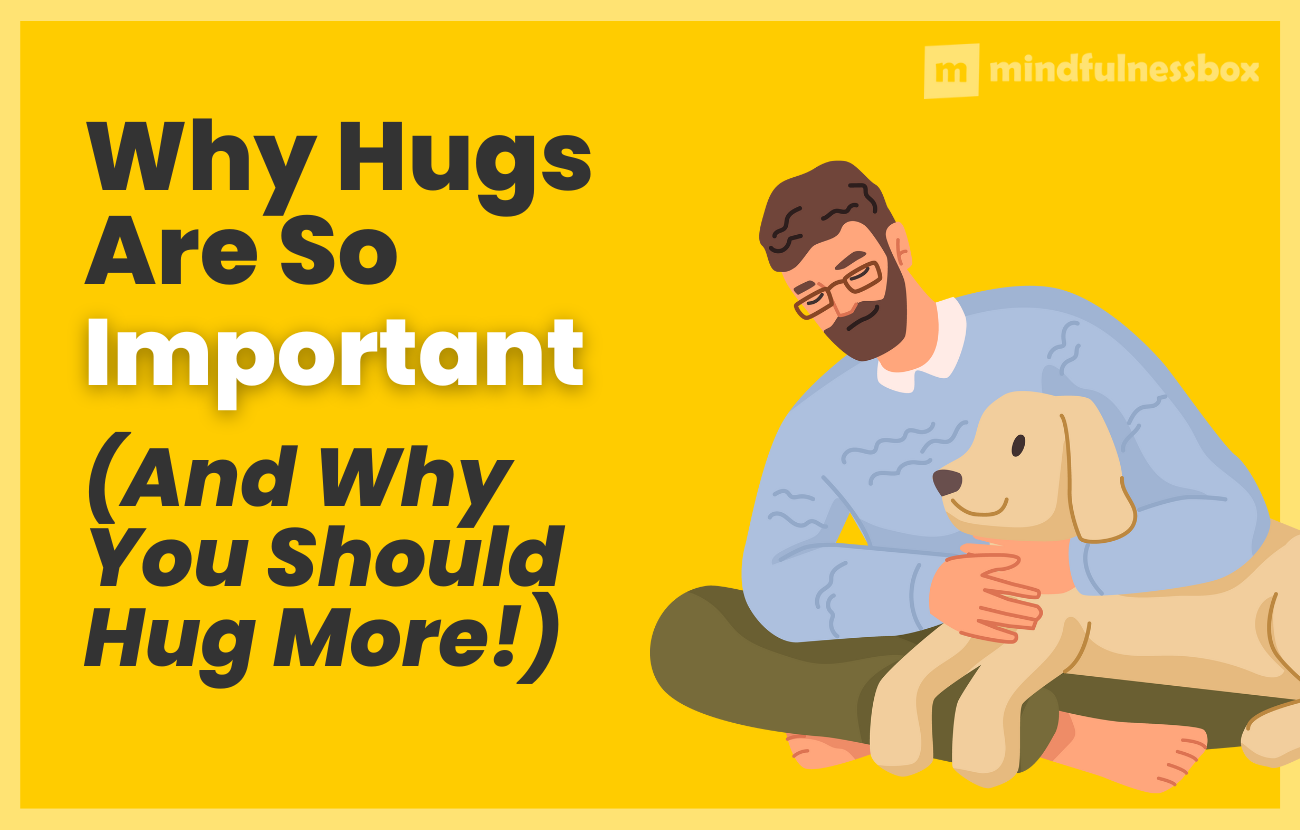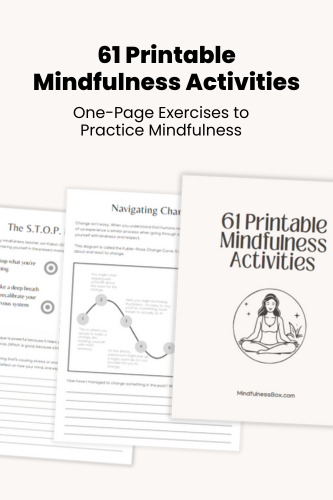Pardon the 1980s cartoon reference, but The Care Bears were onto something:
Hugs are powerful.
Get dozens of one-page exercises to help practice mindfulness, meditation, gratitude, and self love. Perfect for printable handouts when teaching mindfulness to groups, students, or in the workplace.
To see examples, plus a full list of the 61 exercises included, click below.
More powerful than we want to admit.
I’ll sometimes find myself mindlessly ruminating on something or other, assuming that THOUGHTS will solve whatever the problem is. But in reality, it’s my nervous system that needs settling.
Why doesn’t it feel more natural to accept that physical touch can help resolve mental ruminations? Speaking for myself, I think there’s a good deal of ego in play.
Hugs, as a solution to emotional distress, require vulnerability and humility. Even hugging myself requires accepting that, however smart I think I am, my brain is simply not getting me through the difficult emotions I’m experiencing.
Before we go any further, let me say this:
Hugging more doesn’t require you to live with your family. You don’t have to have a romantic relationship, either. Hugging your cat, your dog, your guinea pig, or yourself (seriously!) provides some of the same calming benefits.
Okay—so let’s get into the magic of hugs.
5 reasons why hugs are so powerful
Hugging causes the release of oxytocin, also known as the “cuddle hormone.” Oxytocin has a calming effect on the body and can decrease stress levels.
This is why a hug can feel like a breath of fresh air in a tense situation. (Let’s be honest: hugs probably solve more arguments than words do). It’s also why hugging before or during a stressful event, like waiting for the results of a medical test, can be a powerful stress-reducer.
When you get a hug, and the dose of oxytocin that comes with it, here’s what’s happening:
- Social bonding: Hugs bring you closer to other people, promoting feelings of trust, empathy, and connection and creating stronger bonds.
- Stress reduction: Oxytocin reduces your stress levels by lowering cortisol levels.
- Pleasure: Oxytocin activates the brain’s reward system. Just like chocolate or other pleasure-spiking foods and activities, hugs lead to a (healthy) rush of positive endorphins.
- Pain relief: Oxytocin reduces the perception of pain.
- Nonverbal communication: Have you ever hugged someone and just felt understood? Hugs and physical touch can increase understanding and feelings of empathy in ways that words often can’t match.
Sound like pseudo-scientific mumbo jumbo?
It’s not. In fact, the power of hugs has serious research behind it.
What research says about why hugs are good for you
The hug effect is real. Research from 2015 found that hugging plays a role in pain relief, and a 2011 study found that hugging yourself can lead to pain relief. A 20-second hug releases enough oxytocin to measurably improve your wellbeing.
Hugging also strengthens your immune system. A 2014 study at Carnegie Mellon University found that people who hug more get sick less. This could be because hugging boosts the immune system by promoting the production of white blood cells, which help fight off disease.
Finally, hugging just plain makes you happier—measurably—by increasing the levels of serotonin in your body. While low levels of serotonin can lead to sleep disorders and obesity, higher serotonin levels help you feel more confident, calm, and happy.
Your mindful mission, should you choose to accept it…
Hug more! Seriously—as soon as you’re done with this email, of course—give yourself a hug, or hug a willing participant or pet nearby. 20 seconds is all it takes.

My mindfulness practice kicked off in 2016 with a ten-day silent retreat. Since then, I’ve read dozens of books about mindfulness and completed hundreds of hours of meditation. Thinking about what makes humans happy, calm, and peaceful is endlessly fascinating to me.


